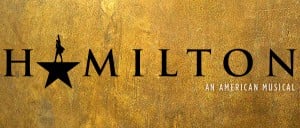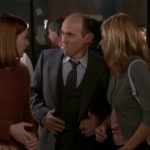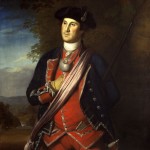I’m a sucker for American History, especially the Revolution. But I like stories that keep the drama to a realistic perspective. I don’t like Turn because there isn’t as much history as there is drama. I liked Sons of Liberty in spite of the inaccuracies of the love triangle between Joseph Warren, Margaret, and General Gage. On paper, Hamilton shouldn’t work. But it does. It’s jam-packed with 46 musical numbers that establish who everyone is and moves the plot along. It’s basically a hip-hopera that succeeds in a way that previous attempts at hip-hop/opera didn’t. Because the musical has about 46 or so musical numbers that basically flow into each other, I’m not gonna do a track by track review, but talk about the story the songs tell me.
I’ll be honest when I say that I honestly didn’t know much about Alexander Hamilton going into this musical. He’s most famous for being involved in the American Revolution, writing most of the Federalist papers, creating the current system of treasury, and dying in a duel. But this musical doesn’t just bring Hamilton to life, but all of his contemporaries as well. It’s best seen in the opening number “Alexander Hamilton.” It acts as the “prologue” of the story and it’s already amazing that Hamilton was able to get out of the Caribbean with nothing but the money people raised to get him out and his writing skills.
What’s most interesting is that even though Aaron Burr is an antagonist, he’s not exactly a villain. He’s shown his sympathetic moments in the second number “Aaron Burr, Sir.” He reminds me of politicians who aim to please without really standing for anything. And yet, he still has love for his daughter Theodosia and has his own ambitions. (Note: Theodosia was originally illegitimate but Leah Libresco told me that Burr ended up marrying Theodosia’s mom after her first husband died.)
Act II introduces Jefferson and Madison, who are also antagonistic figures due to being Hamilton’s political rivals, but the awesome Cabinet Battle numbers show that Jefferson’s desires have some basis in logic. However, reality is more complicated than Jefferson’s ideas. Jefferson, Madison, and Burr have a villain song in “The Room Where it Happens” and “Washington on Your Side,” which shows their jealousy for Hamilton. Both Jefferson and Madison end up paying their respects for Hamilton in the closing number because Hamilton’s financial system turned out to be a good thing in the long run. And Burr realizes the cost of letting his jealousy go too far in “The World Was Wide Enough.” You feel really sorry for Burr at the end.
You could could argue from “You’ll Be Back,” “What Comes Next,” and “I Know Him” that King George III is the villain in this musical, but he never interacts with Hamilton. He’s just there to be America’s clingy ex-boyfriend, the comic relief in this intense, dramatic musical. Props to Jonathan Groff, btw, because I honestly didn’t recognize his voice when I listened to his tracks.
Hamilton could’ve easily been “Mister Perfect” in this musical, but his flaws are seen in this show as much as all the other characters. He’s definitely extraordinary, brilliant, and innovative, but he’s also shown to be arrogant and short-sighted at times. His short-sightedness shows in “Say No to This” especially and in Hamilton’s decision to publish the Reynolds pamphlet. Hamilton’s dreams of rising up seem to be going down in flames because marital fidelity is still something we value. The whole incident feels Clinton-esque and I want to slap Hamilton upside the head for falling for such a cheap trick and not thinking things through.
The musical also develops historical figures I never knew before, namely the Schuyler sisters. (Pronounced “skylar”) The Schuyler Sisters are forward-thinking intelligent women, especially Angelica who’s looking for a mind at work. Angelica is gunning for feminism two centuries before the first wave feminist movement and yet I find it believable because intellectual revolutions come around in times of war.
“Helpless” and “Satisfied” fully establish the characters of Eliza and Angelica Schuyler. Eliza is more of a hopeless romantic, wanting a quiet, domestic life (as seen in “That Would Be Enough”) while Angelica needs to marry rich and wants to marry someone who could match wits with her. They’re also both in love with Hamilton. Once you realize how similar “Helpless” sounds to “Countdown” by Beyonce, you can never un-hear the similarities. Eliza, being Hamilton’s wife, gets major character development as she deals with Hamilton’s ambitions and mistakes. “Burn” is a tear-jerking number because she’s not gonna stand by her man, and yet “It’s Quiet Uptown” is also tear-jerking because of the way Eliza and Hamilton reconcile. It takes a death to bring them together. It takes Hamilton dying for Eliza to finally stand by her man.
I also learned more of Hamilton’s comrades in arms, John Laurens and the Marquis de Laffayette. Given my bias towards all things French, I have a soft spot for the Marquis in all his over-the-top bravado. Mulligan is the rough-and-tumble Irishman who ends up becoming more of a minor character compared to everyone else.
The musical makes John Adams the butt of the joke in a couple of numbers such as “I Know Him” and “The Adams Administration”. It’s surprising that Adams isn’t even in the musical at all, but the cast is already large enough with a ton of musical numbers. But it’s a good thing John Adams has his own musical anyway. To quote said musical:
“Consider yourselves fortunate that you have John Adams to abuse, for no sane man would tolerate it!”
And while we’re on the subject of running gags, please leave New Jersey alone. That joke is getting old.
For me, though, the most intriguing character is George Washington. George Washington would usually be the star of a musical, but in this play he plays the role of Hamilton’s mentor. Washington is the main reason Hamilton gets so far up the social ladder, and yet he and Hamilton don’t always agree. It was sweet when I heard Washington refer to Hamilton as “son” because Hamilton never had a father and Washington had no children with Martha. Hamilton wants to defend Washington in the hopes of gaining his own regiment but I feel like Hamilton also loves Washington as much as anyone could love a hero.
Washington seems the most aware of the future, even more so than Hamilton, because he tells Hamilton to always be aware of who tells his story.
To me, the real story of Hamilton is about legacy. I love that Lin Manuel-Miranda chose to make the cast diverse because it shows how anyone from any race or ethnicity can relate to these historical figures. We can understand these characters and their desires. By making no real villains, we can see the complexity of the politics and see our own political atmosphere in this story. I so wish political debates were as cool as the Cabinet Battles!
I can’t wait for the day that high schools create their own productions of this play because it’s educational as much as it is educational. They have to deal with the cussing, though, but seriously. There needs to be a high school version of this hip-hopera. Like now. Also, can someone take me to Broadway so I can watch this live?!
For now, give this album a listen. It’s a seriously good one.













